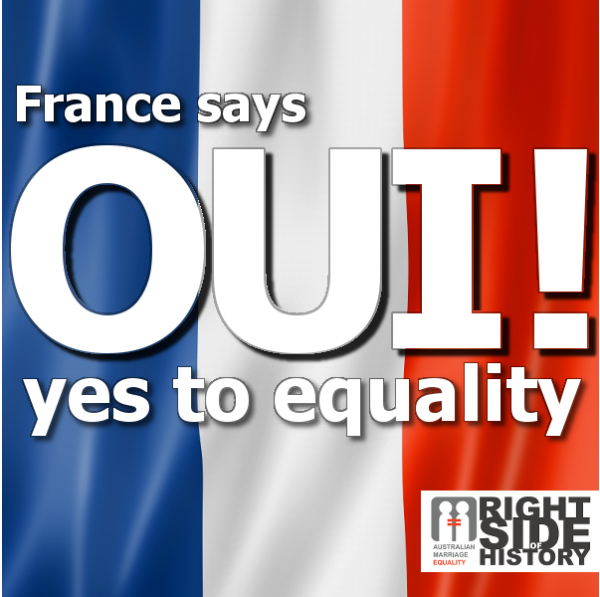
THE French parliament has legalised same-sex marriage after months of bruising debate and street protests that brought hundreds of thousands to Paris.
Last night’s 331-225 vote came in the Socialist majority National Assembly. France’s justice minister, Christiane Taubira, said the first weddings could be as soon as June.
Opponents of the law say France is not ready to legalise adoption for same-sex couples, and polls show a France sharply divided on the issue.
Thousands of police mobilised ahead of the vote, preparing for duelling protests around the National Assembly building and along the Seine River. At least one spectator was ejected from the gallery.
France is the 14th country to legalise gay marriage, and the vote comes a week after New Zealand – with very little controversy – allowed same-sex couples to wed.
In February, parliamentarians voted 329-229 in favour of the bill on its first reading and a similar result was anticipated overnight.
Supporters were planning a celebratory rally and opponents will stage protests in Paris and across the country, but that is unlikely to be the end of what has been one of the most divisive debates in France’s recent history.
The bill, which will also accord gay and lesbian couples the right to adopt children, will only become law when it is signed by President Francois Hollande and published in the Official Journal.
Opposition parties are hoping to delay that step by challenging the measure through France’s Constitutional Council.
Even if that appeal is quickly dismissed, they will hope that Mr Hollande can be pressured into a decision not to sign the law into force.
That has happened before. Former president Jacques Chirac shelved an unpopular employment law in 2006 in the face of public hostility.
But all the signs are that Mr Hollande will stick to his guns on the issue, despite a popularity slump that has left him with one of the lowest approval ratings any French president has ever endured.
The opposition UMP has succeeded in making the gay-marriage issue a focus of broader discontent with the government, which has also come under fire over the parlous state of the economy and the recent resignation of Mr Hollande’s budget minister for tax fraud.
The socialist leader could scarcely have anticipated the scale of the opposition he would face over a reform that initially seemed to enjoy solid majority backing among French voters.
Recent polls have suggested that a campaign against the bill, in which the Catholic Church initially played the leading role, has shifted opinion to the extent that the electorate is fairly evenly split on both gay marriage and adoption.
Against that background, the debate has become increasingly acrimonious in recent weeks with the socialists accusing the UMP of making common cause with the far-right Front National over the issue.
There have also been reports of a spike in homophobic attacks and claims that far-right extremists have been responsible for some initially peaceful protests degenerating into violence.
Author: AFP
Publication: The Australian
Date: April 24 2013
